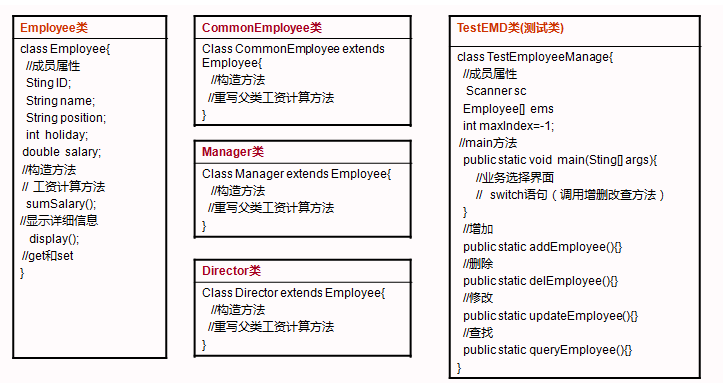员工管理系统ArrayList 更新
员工管理系统数组版
第一部分 案例描述
案例目的
学习面向对象的主要特征和基本概念,包括类、对象、继承、封装、多态、方法的重载和重写、Java的访问修饰符与其它关键字等。
案例难度
★★★
案例覆盖技能点
1、流程控制语句
2、类、对象
3、封装、继承、多态
4、方法的重载、重写
5、访问修饰符
6、static、finally
适用课程和对象
JAVA面向对象编程基础
第二部分 需求和开发环境
使用技术和开发环境
JEclipse3.0或以上、JDK7.0或以上
案例需求
需求说明:
员工信息的基本情况
————————————————————————
普通员工
属性:员工编号、员工姓名、员工职务、请假天数、基本工资
普通员工工资:
在基本工资的基础上增加10%的工作餐,50%的岗位补助,200元住房补助
基本工资+基本工资*0.1+基本工资*0.5+200
————————————————————————
经理
属性:员工编号、员工姓名、员工职务、请假天数、基本工资
经理工资:
在基本工资的基础上增加20%的工作餐,50%的岗位补助,500元住房补助
基本工资+基本工资*0.2+基本工资*0.5+500
————————————————————————
董事
属性:员工编号、员工姓名、员工职务、请假天数、基本工资
董事工资:
在基本工资的基础上增加8%的工作餐,30%的岗位补助,2000元住房补助,3000元投资补助
基本工资+基本工资*0.08+基本工资*0.3+2000+3000
————————————————————————
工资扣除部分,所有员工都一样
无请假,基本工资全发,有请假,扣除每天平均工资 * 请假天数
通过面向对象的编程思想,实现员工信息的增删改查,存储结构为数组。限定数组长度为100,业务流程如下
一、启动业务选择界面
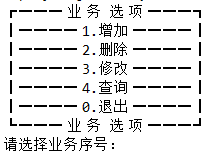
二、增加员工
1.增加普通员工
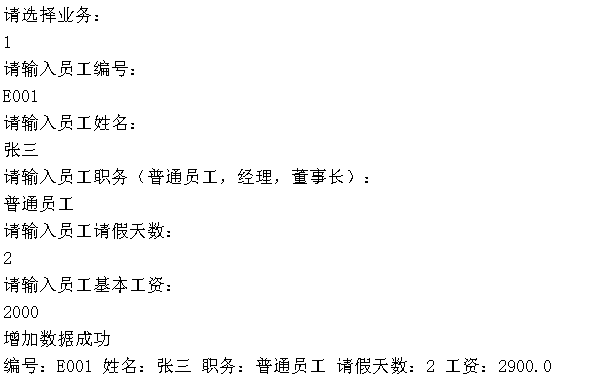
2.增加经理
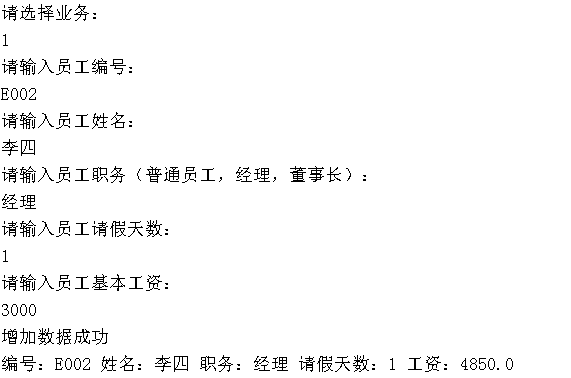
3.增加董事长
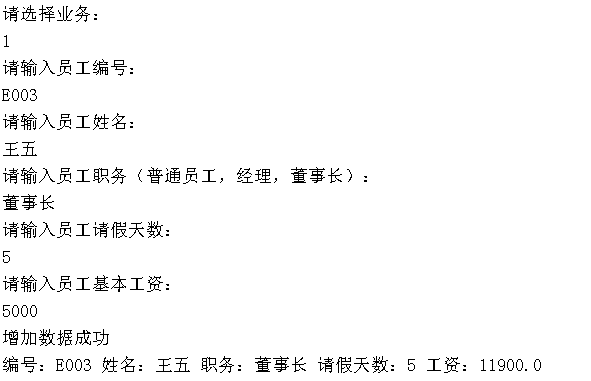
三、删除

四、修改
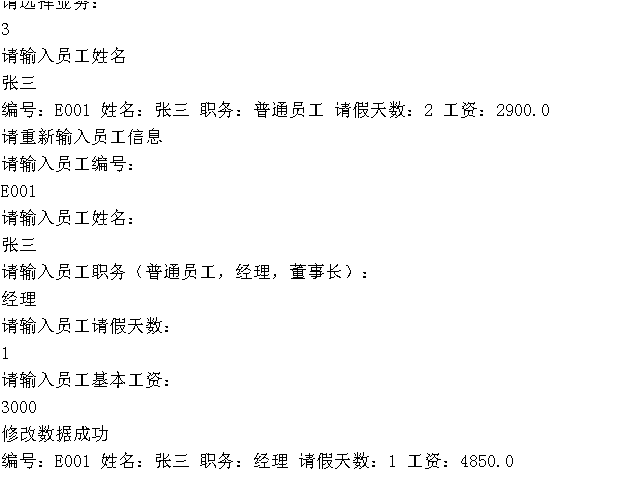
4、查询

4、查询所有
系统基本模块包括:
功能点 难度 备注
父类Employee类的创建 ★★★
三个子类:CommonEmployee类,Manager类和Director类的创建 ★★★
管理类TestEMD类——增加 ★★★★
管理类TestEMD类——删除 ★★★★
管理类TestEMD类——修改 ★★★★
管理类TestEMD类——查询 ★★★★
**
代码如下:
**
com.jerry.employee.main 包:
public class TestEMD {
static Scanner sc = new Scanner(System.in);
static String[] employeelist = new String[100];
static int i = 0;
static Employee employee = new Employee();
static CommonEmployee common = new CommonEmployee();
static Director director = new Director();
static Manage manage = new Manage();
public static void main(String[] args) {
// TODO Auto-generated method stub
while (true) {
System.out.println("┏━━━ 业 务 选 项 ━━━┓\n"
+ "┃━━━━ 1.增加 ━━━━┃\n"
+ "┃━━━━ 2.删除 ━━━━┃\n"
+ "┃━━━━ 3.修改 ━━━━┃\n"
+ "┃━━━━ 4.查询 ━━━━┃\n"
+ "┃━━━ 5.查询所有 ━━━┃\n"
+ "┃━━━━ 0.退出 ━━━━┃\n"
+ "┗━━━ 业 务 选 项 ━━━┛");
System.out.println("请选择业务序号:");
int xuhao = sc.nextInt();
switch (xuhao) {
case 0:
System.out.println("您已退出系统,谢谢使用!");
break;
case 1:
TestEMD.addEmployee();
break;
case 2:
TestEMD.delEmployee();
break;
case 3:
TestEMD.updateEmployee();
break;
case 4:
TestEMD.queryEmployee();
break;
case 5:
TestEMD.queryAll();
break;
default:
System.out.println("请正确选择序号!");
main(args);
break;
}
}
}com.jerry.employee.methods 包:
1 - CommonEmployee 类:
public class CommonEmployee extends Employee {
void Employee(String iD, String name, String position, int holiday, double salary) {
this.ID = iD;
this.name = name;
this.position = position;
this.holiday = holiday;
this.salary = salary;
}
/*
* 重写父类sumSalary方法
* @see com.jerry.employee.models.Employee#sumSalary()
*/
public double sumSalary(double salary){
double newSalary = salary+salary*0.1+salary*0.5+200;
return newSalary;
}
}2 - Director 类
public class Director extends Employee {
void Employee(String iD, String name, String position, int holiday, double salary) {
this.ID = iD;
this.name = name;
this.position = position;
this.holiday = holiday;
this.salary = salary;
}
/*
* 重写父类sumSalary方法
* @see com.jerry.employee.models.Employee#sumSalary()
*/
public double sumSalary(double salary) {
double newSalary = salary+salary*0.08+salary*0.3+2000+3000;
return newSalary;
}
}3 - Manage 类
public class Manage extends Employee {
void Employee(String iD, String name, String position, int holiday, double salary) {
this.ID = iD;
this.name = name;
this.position = position;
this.holiday = holiday;
this.salary = salary;
}
/*
* 重写父类sumSalary方法
* @see com.jerry.employee.models.Employee#sumSalary()
*/
public double sumSalary(double salary) {
double newSalary = salary+salary*0.2+salary*0.5+500;
return newSalary;
}
}4-EmployeeManager类
public class EmployeeManager {
Scanner sc = new Scanner(System.in);
CommonEmployee common = new CommonEmployee();
Director director = new Director();
Manage manage = new Manage();
ArrayList list = new ArrayList();
/*
* 增加
*/
public void addEmployee() {
Employee employee = new Employee();
System.out.println("请输入员工编号:");
String id = sc.next();
System.out.println("请输入员工姓名:");
String name = sc.next();
System.out.println("请输入员工职务(普通员工,经理,董事长):");
String position = sc.next();
System.out.println("请输入员工请假天数:");
int holiday = sc.nextInt();
System.out.println("请输入员工基本工资:");
double salary = sc.nextDouble();
employee.setID(id);
employee.setName(name);
employee.setPosition(position);
employee.setHoliday(holiday);
if ("普通员工".equals(position)) {
employee.setSalary(common.sumSalary(salary));
} else if ("经理".equals(position)) {
employee.setSalary(manage.sumSalary(salary));
} else if ("董事长".equals(position)) {
employee.setSalary(director.sumSalary(salary));
}
list.add(employee);
System.out.println("数据添加成功!");
System.out.println(employee.toString());
}
/*
* 删除
*/
public void delEmployee() {
System.out.println("请输入要删除的员工姓名:");
String delName = sc.next();
System.out.println("您要删除的员工信息如下:");
int flag = 0;
for (int i = 0; i < list.size(); i++) {
if (list.contains(delName)) {
System.out.println(list.get(i));
flag = i;
break;
}
}
list.remove(flag);
System.out.println("数据删除成功!");
}
/*
* 修改
*/
public void updateEmployee() {
Employee employee = new Employee();
System.out.println("请输入要修改的员工姓名:");
String updateName = sc.next();
System.out.println("您要修改的员工信息如下:");
int flag = 0;
for (int i = 0; i < list.size(); i++) {
if (list.contains(updateName)) {
System.out.println(list.get(i));
flag = i;
break;
}
}
System.out.println("请重新输入信息:");
System.out.println("请输入员工编号:");
String newId = sc.next();
System.out.println("请输入员工姓名:");
String newName = sc.next();
System.out.println("请输入员工职务(普通员工,经理,董事长):");
String newPosition = sc.next();
System.out.println("请输入员工请假天数:");
int newHoliday = sc.nextInt();
System.out.println("请输入员工基本工资:");
double newSalary = sc.nextDouble();
employee.setID(newId);
employee.setName(newName);
employee.setPosition(newPosition);
employee.setHoliday(newHoliday);
if ("普通员工".equals(newPosition)) {
employee.setSalary(common.sumSalary(newSalary));
} else if ("经理".equals(newPosition)) {
employee.setSalary(manage.sumSalary(newSalary));
} else if ("董事长".equals(newPosition)) {
employee.setSalary(director.sumSalary(newSalary));
}
list.set(flag, employee);
System.out.println("数据修改成功!");
System.out.println(list.get(flag));
}
/*
* 查询
*/
public void queryEmployee() {
System.out.println("这是查询方法");
System.out.println("请输入要查找的员工姓名:");
String queryName = sc.next();
System.out.println("您要查找的员工信息如下:");
for (int i = 0; i < list.size(); i++) {
if (list.contains(queryName)) {
System.out.println(list.get(i));
break;
}
}
}
/*
* 查询所有信息
*/
public void queryAll() {
System.out.println("所有员工信息如下:");
for (int i = 0; i < list.size(); i++) {
System.out.println(list.get(i));
}
}
} com.jerry.employee.methods 包:
public class Employee {
public String ID;
public String name;
public String position;
public int holiday;
public double salary;
/**
* 无参构造
*/
public Employee() {
super();
}
/**
* 有参构造
* @param iD
* @param name
* @param position
* @param holiday
* @param salary
*/
public Employee(String iD, String name, String position, int holiday, double salary) {
super();
ID = iD;
this.name = name;
this.position = position;
this.holiday = holiday;
this.salary = salary;
}
public String getID() {
return ID;
}
public void setID(String iD) {
ID = iD;
}
public String getName() {
return name;
}
public void setName(String name) {
this.name = name;
}
public String getPosition() {
return position;
}
public void setPosition(String position) {
this.position = position;
}
public int getHoliday() {
return holiday;
}
public void setHoliday(int holiday) {
this.holiday = holiday;
}
public double getSalary() {
return salary;
}
public void setSalary(double salary) {
this.salary = salary;
}
@Override
public String toString() {
return "Employee [ID=" + ID + ", name=" + name + ", position=" + position + ", holiday=" + holiday + ", salary="
+ salary + "]";
}
/*
* 父类方法,计算工资
*/
public double sumSalary() {
return 0;
}
}